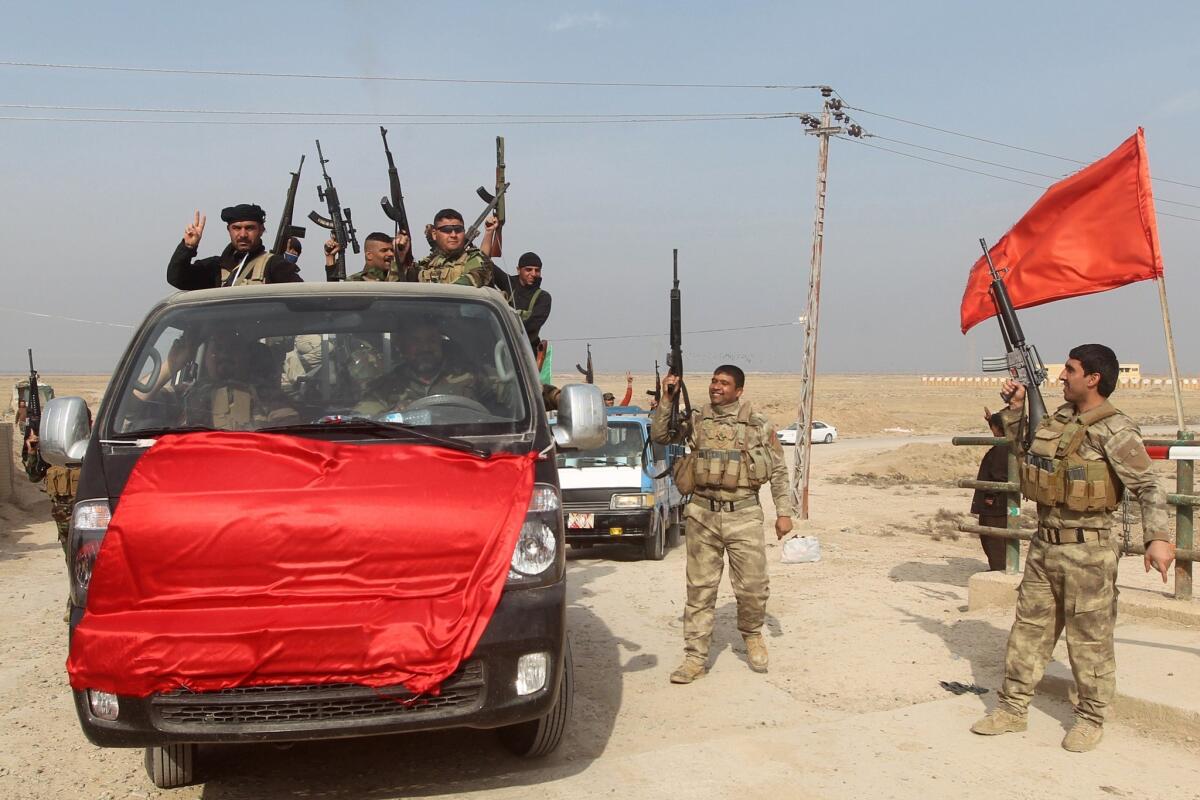Iraq officials vow to investigate alleged massacre of Sunnis

- Share via
Reporting from Beirut — Iraqi officials on Tuesday promised to investigate reports that at least 70 civilians, including women and children, were slain during a bloody government campaign to seize control of the embattled eastern province of Diyala.
Sunni Muslim tribal leaders have accused Shiite Muslim militias working with government forces of carrying out a massacre near the Sunni-dominated village of Barwanah.
“These criminal acts aim to rip apart the social fabric of Diyala,” provincial Gov. Amer Majmaii said in a statement released Tuesday, according to Sumariyah News, an Iraqi media outlet.
The ethnically and religiously mixed province has been the site of sectarian clashes since the U.S.-led invasion in 2003 ousted former Iraqi leader Saddam Hussein.
Islamic State militants swept into the province last year as part of their advance through northern and eastern Iraq. Pro-government militias have been systematically pushing the militants out of Diyala for months.
Gen. Jamil Shamri, provincial police chief, said in a statement released by the Interior Ministry that Diyala was now “empty of Daesh after liberating the last of areas under its control in the villages north of the district of Muqdadiyah.” Daesh refers to Islamic State.
According to the Reuters news agency, Sunni tribal sheiks from Muqdadiyah on Monday blamed the Shiite militias for acting with impunity.
“The security forces are unable to restrain them,” said Sagar Jabouri, a Sunni tribal leader, Reuters reported. “We will defend ourselves. We are afraid we will be next.”
A spokesman to the Interior Ministry, reached by telephone in Baghdad, denied the charge, saying that “Daesh is trying to confuse matters and turn public opinion against the pro-government forces.”
The incident again underscores the risk posed by Baghdad’s heavy reliance on Shiite militias to battle Islamic State, a Sunni group that has tried to win over disaffected members of the country’s Sunni minority. Islamic State has been accused of mass killings of Shiites, whom the group views as apostates. The militants also seek to topple the Shiite-dominated national government in Baghdad.
Shiite paramilitary factions, some aided by predominantly Shiite Iran, have played a key role in government combat operations against Islamic State militants. But some Sunni residents view the Shiite militias as little more than death squads and armed marauders.
Thousands of Iraqi Sunnis and Shiites were tortured, killed or “disappeared” in vicious sectarian clashes between 2006 and 2008, when U.S. forces were deployed en masse in Iraq. Many Iraqis fear that the country could descend back into all-out sectarian warfare.
Diyala province was long a hub of the Sunni insurgency against U.S. forces in Iraq. Abu Musab Zarqawi, the Jordanian leader of the Islamic State’s precursor group Al Qaeda in Iraq, designated Diyala as the capital of a proposed Islamic caliphate. He was killed in 2006 in a U.S. airstrike near Baqubah, the provincial capital.
Diyala shares a long border with Iran, which opposes the Islamic State militants. Iranian military advisers have aided pro-government Iraqi forces in the Diyala area and Iranian warplanes reportedly have targeted Islamic State forces inside Iraq.
The Badr Brigades, the Shiite paramilitary group that is a major recipient of Iranian weapons and training, played an essential role in retaking Diyala province.
On Sunday, Hadi Ameri, secretary-general of the related Badr Organization, declared in a news conference that Muqdadiyah had been “cleansed” of the militants in three days of intense clashes, leading to heavy losses on both sides.
Bulos is a special correspondent. Times staff writer Patrick J. McDonnell contributed to this report.
Follow @mcdneville on Twitter for news out of the Middle East
More to Read
Sign up for Essential California
The most important California stories and recommendations in your inbox every morning.
You may occasionally receive promotional content from the Los Angeles Times.











